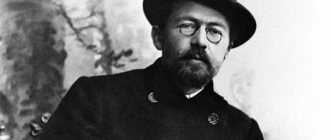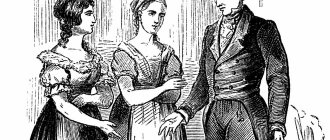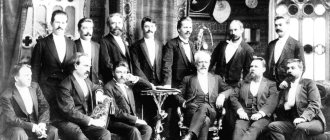During the era of romanticism in Europe, there was a very wide interest in folklore subjects. They are reflected both in prose and poetry: in Hoffmann’s short stories and the fairy tales of the Brothers Grimm. In poetry, these are the ballads of Goethe and Burger. For example, Goethe’s world-famous ballad “The Forest King” is often interpreted, and not only in literature. On Russian soil, Zhukovsky’s literary translation is exemplary, which turned out to be so original that it became an independent work based on the work of the German poet.
History of creation
Johann Wolfgang von Goethe wrote the ballad "The Forest King" in 1782. The poet borrows the very image of the evil forest spirit from the Danish legend of the Elf King, which was translated into German by Johann Herder. Zhukovsky creates his own version of “The Forest Tsar” in 1818.
If you compare his ballad with the original, you can see a lot of fundamental differences in the creation of images. For example, Goethe more keenly conveys the experiences of the father, while the King of the Forest offers temptations more suitable for a child: maternal care, games, round dances. In Zhukovsky, we encounter a more traditional for Russian perception, affectionate address to the father “darling,” and the Forest Tsar himself is depicted not with a tail, but “with a thick beard,” which is again more familiar to the Russian consciousness. All this allows us to believe that the Russian poet created his unique work only based on the German model.
Zhukovsky created his works at a time when the reading public believed that Russian literature did not exist, and it was impossible to write works in their native language. Therefore, educated people read “The Forest King” and many other masterpieces of Western European literature in the original. The poet was faced with a very difficult task: to prove that the Russian language is capable of standing on the same level with such great languages as French, German and English.
Analysis of the ballad “The Forest Tsar” by V.A. Zhukovsky.
Vasily Andreevich Zhukovsky is one of the greatest representatives of Russian poetry, who, in addition to poetry, was fond of translation. Throughout his life, he wrote and translated many wonderful works. The ballad “Forest King” deserves special attention, which stands apart in his work. This is a translation of the work “Erlkonig”, owned by I.O. Goethe. However, V.A. Zhukovsky not only conveyed the meaning of the ballad word for word, he actually created an innovative approach to translation. At the beginning of the 19th century, few people dared to deviate from the source code, but Zhukovsky did this and it was his version that was recognized as the best in terms of perfection of form.
In terms of genre, this is a ballad, but it is completely atypical. Typically, ballads tell about events of a romantic nature, or about military exploits of bygone times. “The Forest King” tells the tragic story of a father’s journey with a small child through a forest thicket. During it, the lord of the forests pays attention to the baby and this leads to a dramatic outcome. The forest king takes the life of a child, taking him for himself. The plot of the work itself is an allegory, because the baby was so weakened that he became delirious. The forest king with his treacherous daughters, dreaming of taking the child for themselves, were only a figment of his imagination, all dialogues existed only in the baby’s head. This fact is confirmed by the words of the boy’s father, who finds the usual explanation for everything. The face of the forest king, according to him, is just fog:
Does your teacher check for plagiarism? Order a unique work from us for 250 rubles
Connect with us:
“Oh no, the fog is white over the water.”
The conversations of the ominous king are just whispers of leaves:
“Oh no, my baby, you misheard: The wind, waking up, shook the leaves.”
And his daughters did not nod to the boy, luring him to them:
“Oh no, everything is calm in the depths of the night: The gray willows stand to the side.”
But the child kept seeing these mythical characters and at the very end of the work, he seemed to hear the words of the forest king:
“Child, I was captivated by your beauty: Willingly or willingly, you will be mine.”
The ballad ends tragically, the boy dies:
“The rider is urging on, the rider has galloped... In his hands lay a dead baby.”
The artistic features of The Forest King are unique. Despite the fact that there are two real characters in the work - a father and son and one fictional one - a forest king, there is also a narrator, whose presence is felt very keenly, as are his emotions. There is a feeling that the person telling this story empathizes with the misfortune of the travelers with all his soul. Despite the obvious fact that the forest king is a figment of the imagination of a little boy, the narrator keeps readers in suspense until the very end, making them wonder whether the spirit will be able to take possession of the child.
The real and the fantastic combined in a bizarre way in the ballad, blurring the boundaries of transition. Willy-nilly, for a moment the king of the forest seems quite real. Mysticism in the ballad is represented by a scene of an imaginary pursuit of a horse with a rider and his son. The very image of the forest king who appeared to the child can be interpreted as one of the guises of death.
The ballad is rich in means of artistic expression. There are many epithets in the work: “turquoise flowers”, “pearl streams”, “cold darkness”, “beautiful daughters”. There are also personifications, so the wind seems to be a living creature: “The wind, waking up, shook the leaves.” There is a hyperbole: “my palaces are made of gold.” V.A. Zhukovsky actively uses synonyms: “child, baby, baby”; “jumps, rushes”, “stuffy - heavy” and antonyms “child, old man”, “turns white, darkens”. In addition, the work is rich in archaisms: “halls”, “promises”, “cold”. And one cannot help but note the presence of assonance; in “The Forest Tsar” there are many repetitions of homogeneous vowel sounds, which makes it smoother and more melodic.
Ballad “Forest King” by V.A. Zhukovsky is one of his best creations. The work is truly grandiose, written in such a way that one cannot remain indifferent to its plot. Zhukovsky used many techniques to give greater expressiveness. That is why this ballad is a real pearl of Russian literature.
About what?
A father and his seriously ill son are racing through the darkness of the night. The boy has a high temperature, in the medical language of that time, fever, and he is delirious. It seems to the child that the Forest King is chasing them, and he confesses his fears to his dad. The alarmed father understands what this means, but he courageously does not allow despair to get the better of him and drives the horse harder and harder. As a loving and caring parent, he tries to calm his son: the whisper of an evil spirit is the rustling of leaves, the king’s daughters are silvery willows.
Next, the Forest King promises his potential captive gold and games, but the boy is afraid of him and continues to resist his entreaties. When the hope of salvation is already close, the persistent ruler threatens to take the child by force. The father rode, hoping that he had time, but the child was dead.
Analysis
- author and title of the work
The author of the original text of the ballad “The Forest King” is the German classic Johann Wolfgang Goethe. The Russian poet and founder of romanticism V. A. Zhukovsky acted as a translator.
- genre
Ballad.
- History of creation
Goethe composed and committed to paper the ballad in 1782, inspired by the Scandinavian legend of the Elf King. Zhukovsky, in turn, in 1818 adapted the work “The King of the Earls” for the Russian-speaking reader and did it very successfully: his translation “The Forest King” was considered exemplary. The ballad was published in Russian in the same year in the collection “For the Few.”
- theme, idea
Zhukovsky, as a translator, moved away from the plot of the original ballad, preserving the plot, but supplementing it with his personal artistic view. The work tells the story of a dialogue between a father and son battling a fever and delirious. It seems to the boy that the Forest King is chasing them, and he reports this to his father, who understands that his son is in agony and is driving the horses, while at the same time trying to calm the child. The forest king lures the hostage with various pleasures, but the boy resists the temptations. When the long-awaited hope of salvation glimmers, the king threatens to take the child by force. It seems to the father that he managed to gallop, but the boy is already dead.
Unlike Goethe, Zhukovsky dispenses with arguments and sharply states the fact of the tragedy that occurred, gradually escalating an already hopeless situation. The conversation between father and son has a dark overtone: the child’s request for protection faces the distrust and indifference of the parent. Zhukovsky shows the selfishness of a father who brushes aside his son for lack of time: he needs to have time to save the child. The essence of the ballad and the main idea is empathy, human sensitivity, especially to close people, as well as struggle despite the lack of hope.
- means of expression
The ballad is dominated by dark and gloomy epithets: “cold darkness”, “gray willows”, “dark crown”, “timid rider”. A large number of homogeneous members of the sentence are presented, as well as personifications: “the wind, waking up, swayed the leaves”, “the fog turns white”, “the king flashed in his eyes”, “the daughters nod from the branches”, filling the work with mysticism.
- verse rhythm, poetic meter, rhyme
The ballad is written in iambic with adjacent rhyme: the first line rhymes with the second, and the third with the fourth, which helps Zhukovsky successfully build dialogues.
- my attitude
This ballad gave me a feeling of anxiety and fear. Together with its heroes, I experienced the tragedy and let it pass through me, sympathized with my father’s grief and at the same time admired his fortitude, but condemned him for his indifference to the words of a child in his death throes.
Genre and direction
The ballad originates in oral folk art, French writers of the 14th-15th centuries. actively developed this genre in literature, and it is impossible to imagine the poetry of romanticism without these fabulous poems. “The Forest King” is a ballad - a poetic story work that can be melodious in nature. There is usually a fantastic element in a ballad that comes from folklore.
Member of the literary society "Arzamas" V.A. Zhukovsky had the nickname Svetlana in this environment, which is no coincidence. Among all his heritage, ballads are considered the best and unsurpassed works. Moreover, for the most part they are translated. But not only he wrote fantastic poetic stories in Russian, N.I. was also interested in this genre. Gnedich, P.A. Katenin, Zhukovsky’s heirs, A.S., also turned to this form. Pushkin, M.Yu. Lermontov.
Option 3
V. A. Zhukovsky was a talented poet and translator. He adapted many works of famous Western writers for Russian readers. At the same time, unlike most domestic translators of that time, V. A. Zhukovsky did not strive to literally translate the source text, but tried to rework the work, making it more understandable to the Russian reader and adding national flavor.
This was a completely new approach to the translation of literary works, which made V. A. Zhukovsky an innovator.
One of these works is the ballad “The Forest King,” which is a translation of “The King of the Earls” by I. Goethe. V. A. Zhukovsky was able to introduce elements of Russian folklore into the ballad, which was published in 1818 in the collection “For the Few,” and supplement the plot with artistic images. Thanks to this, the work is strikingly different from the original.
This work is very different from other representatives of its genre, which tell about the exploits of epic heroes. The center of the narrative in this ballad is the conversation between father and son. The heroes are driving through the forest, and the child complains to his father about strange visions. The boy also sees the Forest King, who wants to take him away from his father and take him to his lands, endowing him with unimaginable wealth. This frightens the child, and he tries to press him closer to his father, but at the end of the work the boy begins to scream and choke. However, the father does not believe his son’s words, considering them an ordinary fantasy. And at the end of the journey he discovers that his child is dead.
The ballad is an extended allegory. In fact, the visions of the Forest King were the fruit of a child's imagination. Apparently, the child was sick and weakened, which is why he began to delirium. However, reality and fiction are so closely intertwined in the plot that it is almost impossible to distinguish them from each other.
The ballad contains a pronounced mysticism. The image of the Forest King can be considered the personification of death.
The work is full of artistic tropes. The text contains many epithets (“pearl streams”, “cold haze”), metaphors, contrasts and personifications. For example, the author gives intelligence to the wind that sways the leaves.
The vocabulary of the ballad is rich in archaic expressions. In addition, V. A. Zhukovsky uses sound writing, repeating similar vowel sounds. Thanks to this, the work acquires a special sound, similar to a smooth and quiet melody.
This tragic work is one of the best in the work of the great poet. The author skillfully used artistic means, making the ballad expressive and emotional.
The main characters and their characteristics
In Zhukovsky’s ballad “The Forest Tsar” there are three main characters: a father, a son, and the Forest Tsar, who appears to be a sick child.
The father in Zhukovsky’s version is presented as an old man, which adds even more tragedy to what is happening. He tries his best to courageously confront the danger looming over his family, but the disease has overcome the child.
The boy does not understand that he is only imagining an evil spirit; he takes visions for reality. He dies not with a feeling of physical pain, but with a feeling of fear of the Forest King. One can imagine that this is how death comes to a child, because according to Danish legends, it is the forest spirit that visits the seriously ill and takes them with him.
Essay Forest King
Everyone knows that Zhukovsky is rightfully not only an outstanding poet of the golden age of Russian literature, but also a talented translator of foreign works of his “colleagues.” This ballad is the result of a masterful translation of a ballad by the great German writer Goethe, who borrowed the idea of the work from Danish storytellers. Also, do not forget that this masterpiece from both geniuses of their own business came to the liking of almost every art connoisseur of that time, as a result of which “The Forest King” very quickly became popular.
The ballad takes place from the perspective of the narrator, who is trying his best to help a sick child. He, in turn, begins to rave. Zhukovsky wanted not only to convey this terrible atmosphere of a hot situation, but to fully show the fear of the child and the powerlessness of the father (the narrator), who is trying to help his child as quickly as possible. The forest king is a villain who devours an innocent child's soul.
With each line, the intrigue grows, which consists in the question of who will emerge victorious in this fierce battle for life. The author managed to create such a strong emotional impact that when reading, readers seem to experience all the suffering of the unfortunate child, his pain and disappointment.
The ending is also quite unexpected, because the winner of this battle is not the child, but the forest king. The child dies along with all hopes for the victory of goodness and justice. However, Zhukovsky decided to show that in the real world these qualities do not always prevail.
The greatest poet not only translated Goethe’s work word for word, but also made some amendments and his own thoughts and feelings, which makes this masterpiece unique and original. It is also worth noting that most people began to perceive Zhukovsky’s translations as classic, unique works, which once again tells the whole world about the poet’s limitless talent.
Subjects
- Death. This theme is presented in the ballad through the eyes of an adult and a child. A child’s consciousness is not yet able to perceive extinction, so the boy is not afraid to die: he is afraid of the Forest King, he is afraid to be separated from his father. An unhappy parent sees the situation completely differently. He understands that the life of his, perhaps the only heir, is in danger: his son is delusional, and this is a bad sign.
- Mystic. The reader is free to perceive the image of the Forest King in different ways. Perhaps these are just hallucinations of a child in a fever, but nothing prevents us from assuming that this is much more than a terrible mirage. The forest king symbolizes death, evil, darkness and, most importantly, fear.
- Struggle. Both father and son are trying to pass the test, each in their own way. The father wants to help his child, he tries to get him to the doctor as soon as possible. Let's try to imagine that home treatment or a doctor living nearby did not help, but only worsened the boy's condition. And now the father “doesn’t jump, he flies” to another city for help. The child fights with the Forest King himself, he does not agree to any of his temptations, seeks protection from his father, but not everyone reveals the evil spirit. The demon fights with the weakening baby, wanting to take him to his dark, dense domain.
the main idea
One of the most popular ideas for romanticism is the fate of the hero - predestination, evil fate. The same thought permeates the ballad “The Forest King”. The tragedy, sadly enough, has a very real and widespread plot for its time. Perhaps this contributed to the great popularity of the work, both in Europe and in Russia. The heroes are father and son, fate is the Forest King. And nothing can change what must inevitably happen. The ending of the ballad adds even more drama: the father had already galloped, the boy fought to the last, but was one step away from salvation - he died.
Essay 4
“The Forest King” was written by Zhukovsky, in the likeness of Goethe’s ballad “The King of the Earls”. The main plot was transferred from the original work, supplemented with artistic images of the author and emotional experiences.
The plot of the ballad tells the story of a father and his little son, whom he carries in his arms. They ride a horse together, and the little boy complains to his father about the forest king, who threatens to take him to his place. The forest king is truly captivated by the boy’s beauty and wants to take it for himself at all costs. He promises the boy a game with his daughters and all the delights of life in his house. In the end, the rider's son dies in his arms.
This plot is based on an ancient legend about the King of the Earls, who took the life of a boy. Here we can mention that in fact, the forest king is just a non-existent ghost, and the boy is mortally ill, and hallucinates in the form of a creature that wants to take him away. But not all people adhere to this point of view; some believe that there was a real king who took the child away from his father.
The ballad describes events, outlines the emotions of the characters, but does not show the author’s attitude to what is happening. The father is described as a selfish character who does not pay attention to the pleas of the little boy, he wants to reach his destination as soon as possible. From here we can derive the main idea - it is very important to listen to each other, to be attentive to the requests and words of loved ones.
It cannot be said that the father does not love the boy. He consoles him with words, but doesn't actually do anything. The forest king also talks a lot, and loves the boy in his own way. As a result, despite such love, the baby dies. He is left alone with his fears and experiences, despite the fact that his dear and loving father is nearby. The boy is presented as a sweet, kind creature, whose heart is full of compassion for his father. The author wants to make the reader worry with the boy, experience his mental pain and suffering.
Thanks to very precise and sharp phrases, the author emphasizes the dynamics and emotionality of the plot. The calmness of the main characters quickly gives way to despair and panic, and love is replaced by fear and horror. The father does not trust his son's words and denies his feelings and emotions.
The main action of the plot takes place at night, and this intensifies the situation, gives a mystical outline and exacerbates fear.
8th grade, 9th grade
What does it teach?
V.A. Zhukovsky, with his ballad “The Forest Tsar,” calls on the reader to be brave and persistent, to fight to the end, no matter what. Although hope sometimes dies, it is still the last. You must not lose your fortitude and despair, especially when the life of a loved one is in danger. The father has lost his child, but nevertheless he looks like a hero, not a losing sufferer. He did everything he could, and did not wait for a sad fate with folded hands, but he understood: there was practically no chance of salvation. Zhukovsky convinces us: only by believing and hoping is it possible to resist fate.
Author: Alexandra Barbashova
Interesting? Save it on your wall!






